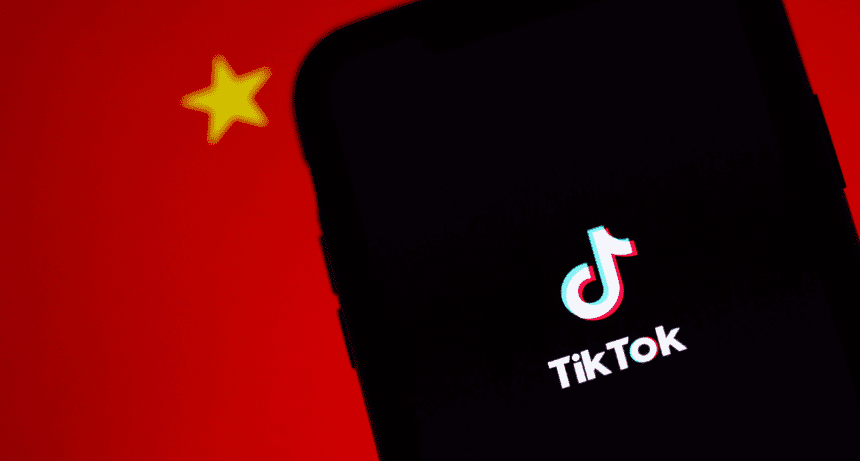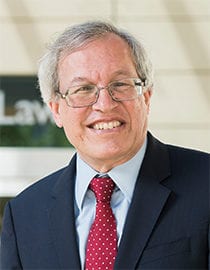
By Andrew Cohen
Teenagers are rarely captivated by international trade wars. But that all changed August 6, when tensions between the United States and China spilled into the social media realm with President Trump’s executive order against the wildly popular video app TikTok.
Suddenly, everyone from middle schoolers to tech law scholars were scrambling to suss out the situation. Citing national security concerns, the order announced that TikTok would be blocked from processing transactions for American citizens and from being downloaded in U.S. app stores after 45 days — and banned unless sold to a U.S. company by November 14. Another executive order sought to ban downloads of the Chinese messaging app WeChat.

The Asia Society of Southern California recently tapped three leading legal scholars, including Berkeley Law Dean Erwin Chemerinsky and Berkeley Center for Law & Technology Executive Director James Dempsey, to unpack the core issues and assess their implications. You can watch the event here.
Moderator Seagull Song, a Berkeley Law LL.M. (2007) and J.S.D. (2010) graduate, described the controversy’s far-reaching nature. “We’re trying to talk about constitutional law, cybersecurity, data privacy, and international relations,” she said. “What are the risks identified by the Trump Administration and how valid are they?”
TikTok, a platform for sharing short self-produced video clips, has more than 100 million users in the U.S. WeChat, which offers messaging, social media, and payment services, has more than 3 million American users and helps family and friends in China and the U.S. stay connected.
“There has been a multi-year growing concern about Chinese products and services in the U.S. telecommunications ecosystem,” said Dempsey, who outlined the dispute’s statutory framework. “The concern began with hardware, and more recently shifted over to data. It’s clear to me that this concern is here to stay.”
Trump administration lawyers argued that ByteDance, TikTok’s parent company, is a mouthpiece for the Chinese government and that U.S. users’ personal information is at risk. TikTok countered that the Chinese government is not granted access to such information and that ByteDance does not process user data in China. On September 27, a district court judge blocked the order to remove TikTok from U.S. app stores.
Similar concerns were raised in the order targeting WeChat, which users widely acknowledge is likely monitored by the Chinese government. On September 19, one day before WeChat faced removal from U.S. app stores, a judge temporarily blocked the order and will hear the administration’s appeal on October 15.
Regulating speech
Chemerinsky, one of the nation’s most renowned constitutional scholars, anticipates that the U.S. Supreme Court will eventually hear the issue assuming that the matters are not resolved in other ways.
“Generally, the Supreme Court sides with the president in matters involving foreign relations,” he said. Even so, and even with a strongly conservative bench, he thinks the court “will rule against President Trump on First Amendment grounds as district courts have done.”
Chemerinsky, who submitted a declaration in the case, argued that the orders against TikTok and WeChat constitute clear violations of the First Amendment by regulating speech.
“These orders restrict the ability of people to speak and receive information,” Chemerinsky said. “TikTok and WeChat are ways people transmit information to others and receive information. The Supreme Court has said that any restrictions of speech over social media or the internet have to meet the most exacting levels of constitutional scrutiny. The government can’t meet that level of scrutiny to justify this.”

Chemerinsky highlighted how the Supreme Court previously ruled that even sexual offenders could not be denied internet access because it had become such a vital means of communication. He explained how the U.S. government is legally required to show a compelling need for such an action and that there is no other way to achieve it. This instance, Chemerinsky asserted, plainly fails to meet that high bar.
“Never before has a president tried to ban a medium of communication,” he said. “That’s what he’s done with TikTok and WeChat. Imagine if a president tried to ban a newspaper. Everyone would agree that violates the First Amendment. This is so much more than that.”
Emblematic orders
UC San Diego professor Susan Shirk, former deputy assistant secretary of state during the Clinton administration, said the executive orders reflect the Trump administration’s hostility toward China. Noting that WeChat has been around for more than 20 years and TikTok for more than two, she wondered why the orders were suddenly issued — and why they drew little distinction between the two companies.
“We haven’t seen any evidence in reality of Chinese exploitation of data with TikTOk, while with WeChat … people know it’s censored but exercise care and stay away from political speech,” Shirk said.
Dempsey described how the executive orders were made under the International Emergency Economic Powers Act. It enables the president to regulate international commerce in response to an extraordinary threat to the U.S. which has its source, in whole or substantial part, outside the country.
The law has been used by presidents mainly to impose economic sanctions against other nations, including President Obama in 2015 against North Korea for its cyber attack on Sony Motion Pictures. Last year, however, Trump used the act to declare an extraordinary emergency with communications services offered by Chinese companies in the U.S.
“That order didn’t ban anything, didn’t sanction anything, but it set in motion a process and signaled the president’s intent to look at Chinese participation in U.S. telecommunications services,” Dempsey said.
The law has two main exceptions, which explicitly state that the president has no authority to regulate or prohibit any personal communication or any import or export of any informational material.
“That’s become critical to the debate around TikTok and WeChat,” Dempsey said.